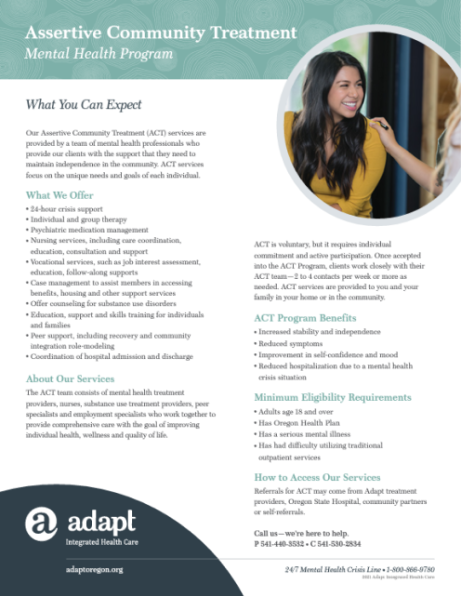
Assertive Community Treatment
Patient Forms
Assertive Community Treatment (ACT) Universal Referral Form
Email the completed referral form to the following:
Douglas County
jaimiep@adaptoregon.org
Curry County
sherrys@adaptoregon.org
Our Assertive Community Treatment (ACT) program provides person-centered, team-based care for individuals living with serious and persistent mental illness (SPMI). ACT is a voluntary, evidence-based model that delivers coordinated services in the community to support health, stability, and recovery.
ACT is an approach aimed at keeping people in contact with critical treatment and support services to improve health and quality of life.
Our Approach
ACT is designed for individuals whose complex needs have not been fully met through traditional outpatient services. Our interdisciplinary team, which includes mental health clinicians, psychiatric prescribers, nurses, substance use treatment providers, peer support specialists, and employment specialists, collaborates to offer a full spectrum of care focused on:
- Reducing hospitalizations and emergency care visits
- Improving housing stability and community integration
- Supporting personal goals and long-term recovery
Our Services
ACT services are delivered where and when needed, including homes, shelters, and community settings, and are tailored to each individual. Services include:
- 24/7 Crisis
- Psychiatric evaluation and medication management
- Individualized treatment planning and mental health therapy
- Integrated substance use disorder treatment
- Nursing care and health education
- Life skills coaching and symptom management
- Peer-delivered support
- Supported employment services
- Housing and benefits assistance
- Family and caregiver education
- Hospital discharge planning and service coordination
Eligibility Criteria
To qualify for ACT, individuals must meet the following criteria:
1. Diagnosis:
- Must have a qualifying SPMI diagnosis, such as Schizophrenia, Bipolar Disorder, Major Depression, or PTSD.
- Individuals with primary diagnoses of substance use disorder, developmental disability, traumatic brain injury, or personality disorders must also meet SPMI criteria to be considered.
2. Functional Impairment:
Significant difficulty in one or more of the following areas:
- Performing basic daily living tasks
- Maintaining employment or independent living
- Securing or retaining safe housing
3. High Service Needs:
Presence of one or more of the following:
- Frequent psychiatric hospitalizations or ER visits
- Persistent severe psychiatric symptoms
- Co-occurring substance use disorder
- Criminal justice involvement
- Risk of or current homelessness
- Inability to engage with traditional outpatient services
How to Refer
Professionals may submit referrals by following these steps:
- Obtain a signed Release of Information (ROI) from the individual.
- Complete the ACT Referral Form fully. Please refrain from using placeholders like “refer to records.”
- Include the anticipated enrollment date.
- Attach relevant documentation:
- Mental health assessment (within past year)
- Treatment plan
- Psychiatric evaluations and progress notes
- History of hospitalizations and emergency visits (past 12 months)
- Any incident reports or behavior documentation
- Email the completed referral packet to the following:
Douglas County: Jaimie Perry – jaimiep@adaptoregon.org
Curry County: Sherry Strain – sherrys@adaptoregon.org - Incomplete submissions will be closed. A complete resubmission will be required to restart the screening process. Referrals are reviewed within 14 days.
Douglas County
3005 NE Diamond Lake Blvd
Roseburg, OR 97471
Phone: (541) 671-6285
fatimaj@adaptoregon.org
Hours:
Monday – Friday
7:00 AM – 3:30 PM
Curry County
615 5th Street
Brookings, OR 97415
Phone: (877) 408-8941
Fax: (541) 440-3537
sherrys@adaptoregon.org
Hours:
Monday – Friday
8:00 AM – 5:00 PM
Learn More

Douglas County
English/Español
Curry County
English/Español